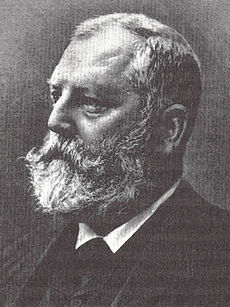
By Erica
What do a woolly mammoth and Liederkranz cheese have in common? They're both smelly! And also, they're both extinct. Emil Frey (left), a Swiss cheesemaker, created Liederkranz in 1891 (many, many years after God created the woolly mammoth). Disgustingly, Emil Frey went on to create Velveeta, an insult to cheeses everywhere. However, Liederkranz was a hit for the Monroe Cheese Company, which was situated in Monroe, New York. Named after a local singing group, Liederkranz means "wreath of song" in German. It's a soft cows milk cheese that came out of an effort to replicate Limburger. The replication was moderately unsuccessful. The cheeses are more fraternal than identical twins; their bacteria cultures--their DNA--are slightly different.
The story of Liederkranz is meandering and sad. Frey followed his beloved cheese when the Monroe Cheese Company moved to Van Wert, Ohio, where Liederkranz was manufactured even after the business was sold in 1929 to the Borden Company, which we know today as Kraft. In 1981, years after Frey had retired from cheese making, the Borden Company decided to stop all of its natural cheese lines in order to focus on processed cheese-- those that involve unfermented ingredients and emulsifiers and have the advantage of a longer shelf life (i.e. American Cheese, Laughing Cow, and Frey's own Velveeta). The Van Wert plant was bought by the Fischer Cheese Company that year and Liederkranz lived on, but only for a short time. In 1985, bacterial contamination of a batch of Liederkranz caused Fischer to discontinue the cheese entirely, and they sold the bacteria strain to The New Zealand Dairy Board. Liederkranz was never seen again.
The closest cheese to Liederkranz today is Bayrisher Bergsteiger Kase, produced by the Kutter Cheese factory in Buffalo, New York. This cheese has a similar texture and taste, but true fans of Liederkranz, "Liederkranzlers", are not impressed. Apparently, a small group is working to bring back the Liederkranz culture from New Zealand. Good luck!
No comments:
Post a Comment